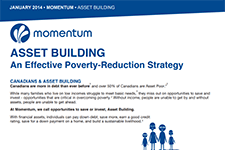Discover financial empowerment resources
Discover financial empowerment resources
This brief explains the asset-building approach to poverty reduction. While many families who live on low incomes struggle to meet basic needs, they miss out on opportunities to save and invest - opportunities that are critical in overcoming poverty. Without income, people are unable to get by...

By 2003, the savings and asset building field had achieved critical research and policy successes. However, some challenges it faced were the lack of a substantial presence of organizations of color in the field and the absence of experts of color at decision-making tables. Over the course of 11...
More than ever, Americans need to be financially savvy. The past few years have shown that mortgages can be complicated, business-cycle downswings severe, and investing far from obvious. And, for many of us, saving is not easy. Creating a successful financial life takes a high level of know-how and...
This is a Presentation showing several different frameworks for assets and financial capability, collected by the CFED. This includes the Household Financial Security framework, the Financial Capability Lifecycle, Road to Economic Security, and...
There is much evidence that the quality of the social determinants of health Canadians experience helps explain the wide health inequalities that exist among Canadians. How long Canadians can expect to live and whether they will experience cardiovascular disease or adult-onset diabetes is very much...
This is a presentation by J. Michael Collins explaining why financial coaching is a more effective intervention to achieve financial capability, compared to financial literacy. He explains the role of counseling, a definition of financial coaching, the role of the coach, and coaching as a form of...
This brief summarizes research into the theories underlying financial coaching and the effects of financial coaching on participant behaviors and outcomes. In practice, financial coaching remains an unregulated field, and individuals and organizations use the term “financial coaching” to refer...
Understanding financial well-being is crucial to helping consumers achieve it. Financial educators, coaches, and other practitioners work to help people improve their financial lives and get to a better state of financial well-being. To tell whether these efforts are successful, the field needs a...
Recognizing the potential of financial coaching to improve the well-being of consumers, the Consumer Financial Protection Bureau (CFPB) commissioned a rigorous study on the impact of financial coaching programs.1 Using a randomized controlled trial design, this study allows, for the first time, a...
Increasing interest in the role that consumer-focused policy interventions can play in improving economic outcomes has led to a host of intervention models in recent years. Financial coaching has emerged as one prominent model in this field, aimed at improving consumer financial outcomes by using...
While financial coaching is becoming more widely implemented, the practice components have not been described in ways that make the field of financial coaching consistent and uniform. To better understand how financial coaching is especially relevant for empowering low-income clients, this brief...
As we hurtle towards a human community of 9.7 billion people by the year 2050, coupled with new technologies and the growing challenges of our planet’s carrying capacity, there is more and more discussion of systems and how they change or are created. The post-war era has witnessed an...
Performance measurement systems are widely used by organizations in both the public and private sectors, with the objective of improving decision making and performance. The cost associated with building and implementing these systems is high, yet many fail to deliver the expected results. This...
Given the importance of financial security to a wide range of customers and issues and the cost of delivering those services, we at The Financial Clinic asked ourselves: can financial development services be embedded into established social service delivery models to create scale? And, can...
CFED has developed a Household Financial Security Framework to help us think through what it takes, at the household level, to build financial security over time. Reducing poverty and achieving financial security and empowerment is a dynamic process in which households iteratively gain skills,...
Research has shown that social isolation has damaging impacts on health, well-being, and overall quality of life. Low-income people and seniors are among the most vulnerable to social isolation. Conversely, being more socially connected has a positive influence on physical and mental health and...
